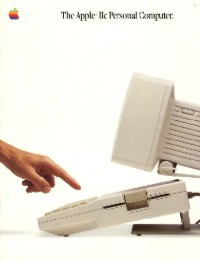Tis the season for nostalgia, apparently. Matt's recent post had me thinking about my early computing memories - playing Choplifter on an Apple IIc, with its tiny green and black screen.  Playing Zork on our new IBM-clone with my dad, as I typed the commands and he carefully drew maps on graph paper.
Playing Zork on our new IBM-clone with my dad, as I typed the commands and he carefully drew maps on graph paper.  Or the many hours I spent on Prodigy message boards while listening to The Connells' Darker Days over and over again. Listening to that album brings me back to the little computer study every time, in an odd Bergsonian memory shift.
Or the many hours I spent on Prodigy message boards while listening to The Connells' Darker Days over and over again. Listening to that album brings me back to the little computer study every time, in an odd Bergsonian memory shift.
While reading through the blogs this morning, I came across Newly Digital: A distributed anthology of early computing experience, which I saw on the MT devs' company website - Six Apart - as I was reading about their forthcoming TypePad. If blogging has done anything for me, it has renewed my enjoyment of web surfing (and since this has become a post of asides), although not for the term "surfing" itself. I always feel more like skulker than I do a surfer, as I peer around the corners of a link.
In any case, I was surprised when I came across Newly Digital after reading some posts and reactions to Matt's entry. Nostalgia isn't uncommon, of course, but in my experience it tends to come in waves (or, maybe I just find it that way). Waves of nostalgia and memory sweep across the various gaming message boards I read - for months the boards will be crowded with trade offers, OT (off-topic) randomness, l33t sp34k, and PK smack talking, but then someone will post a memory of the "early days," which in turn creates a wave of "Do you remember..."-type threads. Recall that several of the graphical Massively Multiplayer games been around almost four to six years (to say nothing of the years of text-based games before that). Asheron's Call started beta test in late 1999 (release was Nov. '99). Everquest was available about 9 months prior to that, and Ultima Online's adventures began in 1997. That's quite a lot of time to build memories.
I often think about the future of these games - what happens when they cease to be profitable? What will we make of the ruins of these worlds, if at some point we recover them? Or will gamers simply continue their quests on their own, running hacked code on pieced-together hardware? Will people figure out a way to save their character, frozen in an odd stasis, world-less?
One of my favorite passages on nostalgia is from Richard Powers' Plowing the Dark. Chapter 16 starts with the first lines of ADVENTURE blinking on a character's screen, late at night, sent anonymously across the network from one of the eighty-six users logged in from a variety of facilities on the west coast:
You are standing at the end of a road before a small brick building.
The passage is a beautiful composition of collective and individual memory, shifting between Jackdaw's childhood recollections and the eight-six users' shared nostalgia:
All a trick, Jackdaw saw in retrospect, an elaborate diversionary tactic to fool a boy into - of all things - reading.
The chapter begins like a small wave, foreshadowing a crescendo comprised of Jackdaw's childhood memory blended with collective recollection as the eighty-six users type subsequent lines from the game to one another over the network. The experience is a carefully crafted commentary on individuality - a playful negotiation between the second-person, non-specific "you" of the game, the collective "we" of the shared nostalgic experience, and the personalized individuality of Jackdaw's recollections of, and gratitude towards, his now-deceased father. The chapter ends softly, like a receding wave:
I love that chapter too, and to me the most moving line in it is this one:
YOU ARE ON THE EDGE OF A BREATHTAKING VIEW.
This is another exceprt from Adventure, and the way Powers uses it here the words seem to capture all the idealism of that generation of computing, a world before Windows, the Web, and so much more, for better and for worse.
That is a fabulous line - it also marks the peak of the chapter, the rest of which falls away like a receeding wave. Really amazing pace established in those twelve pages.
I've been meaning to read PLOWING for some time now. Guess I'll have to move it to the top of the reading list. The image of a game character frozen in cyberstasis is a fascinating one, especially given what Matt called "the broadband blast of streaming screaming everything." I had also totally forgotten about The Connells--talk about nostalgia.
PS: I'll eventually make it over to Wordherders.
Posted by: chuck at June 7, 2003 9:15 AM | Permalink to CommentAnytime you're ready Chuck :)
And yeah, The Connells - wasn't sure if anyone ever listened to them besides me. Went to many a concert in The Boathouse in Norfolk in the late 80s/ early 90s before they started touring more (it semeed) in Britain, where I understand they became quite popular. I think my favorite album was Fun&Games...
Posted by: Jason at June 9, 2003 4:26 AM | Permalink to Comment